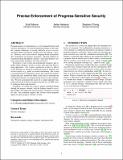| dc.contributor.author | Moore, Scott David | |
| dc.contributor.author | Askarov, Aslan | |
| dc.contributor.author | Chong, Stephen N | |
| dc.date.accessioned | 2014-09-02T13:27:46Z | |
| dc.date.issued | 2012 | |
| dc.identifier.citation | Moore, Scott, Aslan Askarov, and Stephen Chong. 2012. Precise Enforcement of Progress-Sensitive Security. In Proceedings of the 2012 ACM Conference on Computer and Communications Security - CCS '12, 881-893. New York: ACM Press. | en_US |
| dc.identifier.isbn | 978-1-4503-1651-4 | en_US |
| dc.identifier.isbn | 1450316514 | en_US |
| dc.identifier.uri | http://nrs.harvard.edu/urn-3:HUL.InstRepos:12763608 | |
| dc.description.abstract | Program progress (or termination) is a covert channel that may leak sensitive information. To control information leakage on this channel, semantic definitions of security should be progress sensitive and enforcement mechanisms should restrict the channel's capacity. However, most state-of-the-art language-based information-flow mechanisms are progress insensitive---allowing arbitrary information leakage through this channel---and current progress-sensitive enforcement techniques are overly restrictive.
We propose a type system and instrumented semantics that together enforce progress-sensitive security more precisely than existing approaches. Our system is permissive in that it is able to accept programs in which the termination behavior depends only on low-security (e.g., public or trusted) information. Our system is parameterized on a termination oracle, and controls the progress channel precisely, modulo the ability of the oracle to determine the termination behavior of a program based on low-security information. We have instantiated the oracle for a simple imperative language with a logical abstract interpretation that uses an SMT solver to synthesize linear rank functions.
In addition, we extend the system to permit controlled leakage through the progress channel, with the leakage bound by an explicit budget. We empirically analyze progress channels in existing Jif code. Our evaluation suggests that security-critical programs appear to satisfy progress-sensitive security. | en_US |
| dc.description.sponsorship | Engineering and Applied Sciences | en_US |
| dc.language.iso | en_US | en_US |
| dc.publisher | ACM Press | en_US |
| dc.relation.isversionof | doi:10.1145/2382196.2382289 | en_US |
| dc.relation.hasversion | http://askarov.net/ccs12.pdf | en_US |
| dash.license | LAA | |
| dc.subject | Termination channels | en_US |
| dc.subject | progress channels | en_US |
| dc.subject | information flow | en_US |
| dc.title | Precise Enforcement of Progress-Sensitive Security | en_US |
| dc.type | Conference Paper | en_US |
| dc.description.version | Accepted Manuscript | en_US |
| dash.depositing.author | Chong, Stephen N | |
| dash.waiver | 2012-04-08 | |
| dc.date.available | 2014-09-02T13:27:46Z | |
| dc.relation.book | Proceedings of the 2012 ACM Conference on Computer and Communications Security - CCS '12 | en_US |
| dc.identifier.doi | 10.1145/2382196.2382289 | * |
| dash.contributor.affiliated | Askarov, Aslan | |
| dash.contributor.affiliated | Moore, Scott David | |
| dash.contributor.affiliated | Chong, Stephen | |


